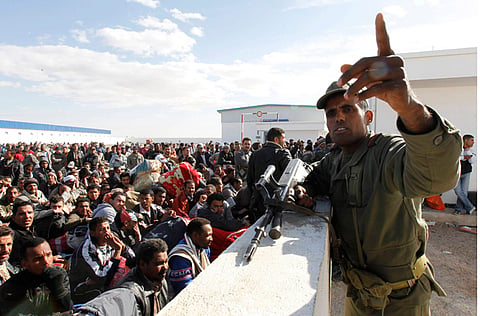Libya envoy to US backs interim government
New temporary government is being formed as protesters gear up to face reprisals

Washington: Libya's ambassador to the United States, Ali Aujali, told Reuters on Saturday he supported a caretaker government being formed by former Libyan justice minister Mustafa Mohammad Abud Ajleil.
"I am supporting the new temporary government which was formed by ... Mustafa Mohammad Abud Ajleil, the former minister of justice. This government is the government of the whole of Libya," said Aujali, who announced earlier this week that he would no longer represent Libyan leader Muammar Gaddafi's government.
"We want to support this government as the caretaker government until the liberation of all of Libya, which I hope will happen very soon."
Tension in the capital
Tension prevailed in the Libyan capital Tripoli and other cities as protesters geared up to face reprisals following Gaddafi’s pledge to arm civilians to defeat a popular revolt that threatens his four-decade rule.
Shops, banks and schools remained closed in the capital and government has set up about 30 checkpoints up to the Tunisian border, which has seen an unprecedented scale of evacuation of foreign workers, witnesses said.
A Tripoli resident said the streets were semi-deserted on Saturday afternoon, though people went out to buy bread and petrol, with long queues at service stations.
Gaddafi’s grip on power looked more tenuous as security forces abandoned many working class neighbourhoods in Tripoli.
Benghazi was lot calmer with banks and shop open for business, but schools stayed shut.
Gaddafi's 41-year grip on power appeared increasingly tenuous on Saturday in the face of a nationwide revolt that follows uprisings that toppled authoritarian rulers in Tunisia and Egypt earlier this year.
The online edition of the Quryna newspaper reported on Saturday that Abud Ajleil had led the formation of an interim government based in the eastern Libyan city of Benghazi.
UN sanctions
Meanwhile, the UN Security Council moved as a powerful bloc on Saturday to try to halt Libyan leader Muammar Gaddafi's deadly crackdown on protesters, slapping sanctions on him, his five children and 10 top associates.
Voting 15-0 after daylong discussions interrupted with breaks to consult with capitals back home, the council imposed an arms embargo and urged UN member countries to freeze the assets of Gaddafi, his four sons and his daughter.
The council also backed a travel ban on the Gaddafi family and close associates, including leaders of the revolutionary committees accused of much of the violence against opponents.
Council members additionally agreed to refer the Gaddafi regime's deadly crackdown on people protesting his rule to a permanent war crimes tribunal for an investigation of possible crimes against humanity.
The council said its actions were aimed at "deploring the gross and systematic violation of human rights, including the repression of peaceful demonstrators."
Members expressed concern about civilian deaths, "rejecting unequivocallythe incitement to hostility and violence against the civilian population made from the highest level of the Libyan government."
With input from Duraid Al Baik, associate editor, and agencies

![Oman’s Maritime Security Centre confirmed four crew members injured. [Illustrative image. ]](http://media.assettype.com/gulfnews%2F2026-03-01%2Fv5np7wj5%2FOil-tanker.jpg?w=320&auto=format%2Ccompress&fit=max)

